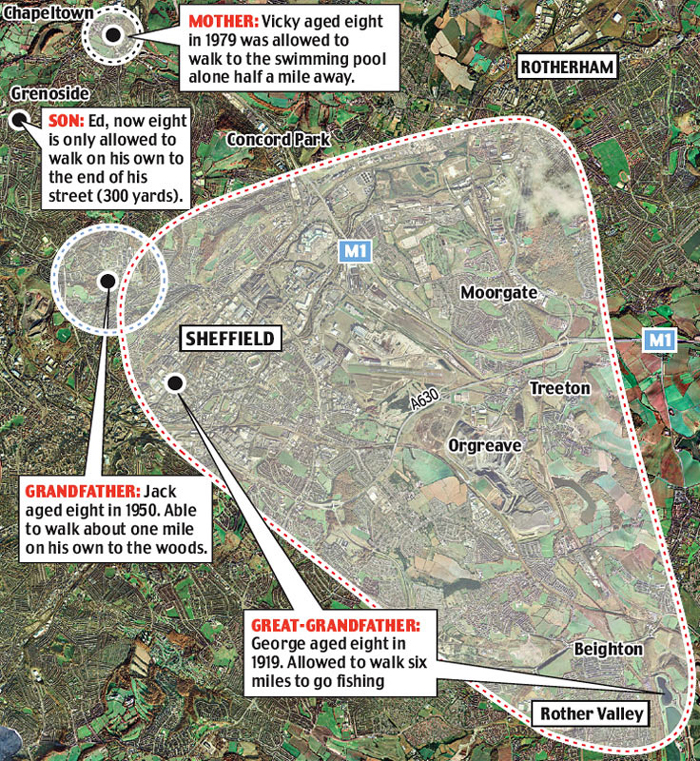Shortening the Leash
Aug 8, 2012
 In 1919, when George Thomas was an eight-year-old growing up in the town of Sheffield in northern England, he and his brothers and friends felt they owned the streets of Sheffield and the fields and forests all around. Their parents didn't mind when they wandered off on adventures of their own devising; even at the young age of eight, he often walked six miles to a fishing pond.
In 1919, when George Thomas was an eight-year-old growing up in the town of Sheffield in northern England, he and his brothers and friends felt they owned the streets of Sheffield and the fields and forests all around. Their parents didn't mind when they wandered off on adventures of their own devising; even at the young age of eight, he often walked six miles to a fishing pond.
In 1950, when George Thomas's son-in-law Jack Hattersley was eight years old in Sheffield, children still routinely walked long distances from home unsupervised. Almost daily, Jack walked a mile to play with his friends (unsupervised) in the woods.
But by 1979, when Jack Hattersley's daughter Vicky was eight years old in Sheffield, children stuck closer to home. Vicky grew up in a suburban subdivision, which she never left except in cars driven by her parents or her friends' parents. Still, she was allowed to walk or ride her bike by herself as far as about half a mile through the neighborhood to her friends' homes or to the swimming pool. And like her father and grandfather, she walked to school every day.
By 2007, when Vicky's son Edward Grant turned eight, unscripted and unsupervised childhood wandering was a thing of the past. Ed has a bike, but to ride it he and his parents travel by car to safe bike paths. His mother drives him to school. He is allowed to walk by himself to the end of his block, about 300 yards, but his parents say he never wants to do that because no other children in the neighborhood are allowed out by themselves to play.
Like many eight-year-olds nowadays, Ed basically stays in his house except when his parents drive him somewhere. This is not a miserable situation for him; unlike his great-grandfather, whose childhood home was cramped and crowded and unadorned with childhood playthings, Ed has a room of his own at home, with plenty of toys and electronic diversions. Since he's never known the freedom to wander that was treasured by generations of children past, he doesn't seem to miss it.
His mother, grandfather, and great-grandfather mourn the loss for him. They are nostalgic for this aspect of their own childhoods. They suspect that some of the fears leading parents to keep children so entirely caged nowadays are overblown. But still, societal norms have become so fiercely hostile to the very idea of letting children loose that no challenge seems possible. It is their duty to keep Ed safe and supervised, even if the consequence is that his childhood is being spent in a gilded prison.
Wonder what will happen to Ed's children?
